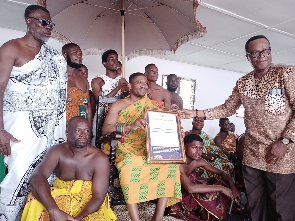A delegation of the Ghana State Book Board has paid a courtesy call on members of the Akuapem Traditional Council in the Eastern Region to introduce and discuss the Ghana State Book concept to the traditional leadership to solicit their support and cooperation towards the exercise.
The committee as part of its mandate to write the history of all paramountcies nationwide met with the traditional leadership at the traditional council where it engaged in extensive deliberations with the Okuapehene, Oseadeyo, Nana Kwasi Akuffo III together with his divisional chiefs.
Having completed the State Books of some paramountcies across the country, the attention of the committee now lies on the people of Akuapem where the committee seeks to work closely with the paramountcy as well as the various divisions to unearth its true history.
The committee in collaboration with the National Commission on Culture, National House of Chiefs, the Chieftaincy and Religious Institution and the Ghana Bureau of Languages, has already completed the Awutu, Techiman, Offinso, Hwidiem, Tepa and Kwahu Traditional Areas among others with Akuapem, New Juaben, Akwamu and Dormaa forming part of its next project.
Previously known as the Ghana History Books, it became imperative in 2013 to change the name to Ghana State Books to underscore its significance as not just a reference point for history aimed at straightening records, but a citadel of broader cultural and customary reference manuscript of all traditional areas.
The significance of the Akuapem experience is therefore aligned to its role as venue where the name Ghana State Books was derived from.
The intended Akuapem State Book forms part of the targeted 15 books covering 15 traditional councils to be written between 2023 and 2024.
A certificate of commencement was presented to the Akuapem Traditional Council to signify the preparedness of the committee to start the Akuapem State Book project.
A member representing each of the divisional areas would form part of the review committee to provide the necessary information required to write the book.
National Coordinator of the Ghana State Books project, Isaac Bright Botchway in an interview described the history of the people of Akuapem as unique as it embodies a composition of the five major Akan pillars including the Ashanti, Denkyira, Akwamu and Kwahu people.
Stressing on the need to write down accurate information, Botchway who said the initiative was long overdue underscored the need to pen down correct information to serve its purpose of enabling unity and not to create discord within any group.
“It’s important to write down accurate information, there’s the potential of conflicts if facts are twisted,” said the national coordinator.
He furthered that though chieftaincy disputes sometimes posed difficulties to the work of the committee, they always devised a peaceful approach to address such issues to ensure that they succeeded in their quest.
He urged the various traditional authorities to ensure that the historical and customary facts are not misrepresented but maintained.
Though many history books have been previously published, the uniqueness surrounding the Ghana State Books stems from the unified endorsement from the respective traditional councils.
Communications Director of the Ghana State Books, David Dontoh reiterated that though some history books were written by some elements within the colonial governments, it was time for the people to tell their own story.
“Fortunately or unfortunately before we had independence, it was the colonial government officials who were writing our history…but they wrote them from what they thought was their history, we thought that that’s not the right way to write history, what you write the history with must come from the people because they own that history,” said the veteran actor.
The project, David Dontoh furthered would not be limited only to Ghana but also capture the exploits of Ghanaians living abroad.
The book, after completion would be stocked in the various traditional collections for use by the judicial committees to serve as a constitution to guide and serve as a reference point for them during adjudications.
Regional News of Wednesday, 2 August 2023
Source: Michael Oberteye













